We surveyed 14,458 people and analyzed over 40,000 of their new year’s resolutions to find the answers.
- Happy people are more likely to create (and keep!) new year’s resolutions.
- “Saving more money” is the most popular new year’s resolution for 2022.
- 36.8% of all respondents want to lose weight in 2022.
- People who never make new year’s resolutions are significantly unhappier than those who do.
- The new year’s resolution that’s most likely to be broken is “Quitting drinking entirely”.
- There is a strong correlation between happiness and keeping your new year’s resolutions. In other words, people who break their new year’s resolutions are more likely to be unhappy.
- “Quit watching porn” and “Giving up masturbation” are primarely picked by men as new year’s resolutions. 😅
These observations – and many more – are covered in this in-depth analysis of our study.
Contents and study topics:
- Happy people make more new year’s resolutions
- What are the most popular new year’s resolutions for 2022?
- Do happy people make different resolutions?
- How many new year’s resolutions are broken?
- Which resolutions are most likely to be broken?
- The impact of a broken new year’s resolution
- Difference between men and women
- Methodology
The link between happiness and making new year’s resolutions
We surveyed 14,458 respondents from around the world and asked them the following questions:
- If you look back at the last year of your life, how would you rate your happiness on a scale from 1 to 10?
- Are you planning on making a new year’s resolution for 2022?
This resulted in the following data:
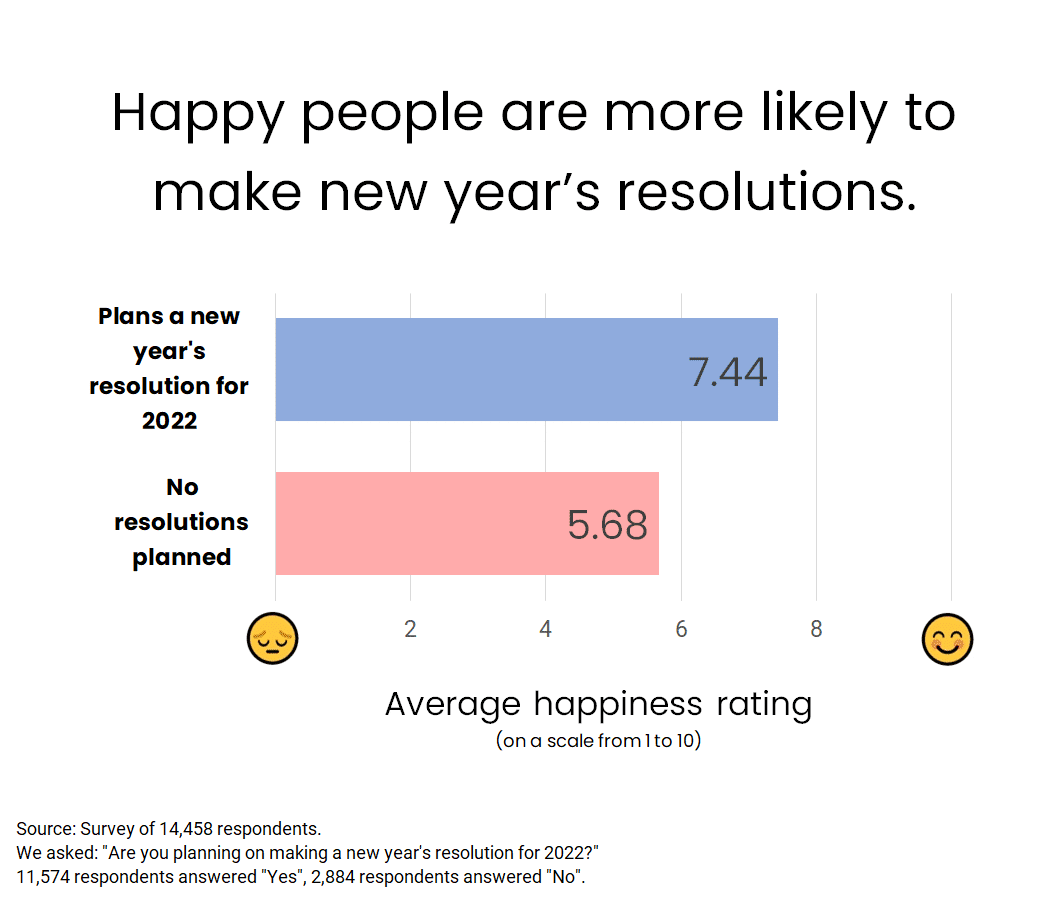
We found that people who are planning to make a new year’s resolution are happier than those who don’t.
Happy people are more likely to make new year’s resolutions.
This is a somewhat surprising result, for a simple reason. In essence, new year’s resolutions are meant to motivate someone to improve their life. Hypothetically speaking, someone who’s perfectly happy doesn’t need any new year’s resolution. In that sense, you would expect that unhappy people are more likely to make new year’s resolutions.
It’s interesting to see that the opposite is true. Luckily, our analysis provides some answers as to why this is.
Respondents were asked about their happiness before they found out the survey was about any new year’s resolutions. We specifically did so to prevent any bias to influence the results of the survey.
Which new years resolutions are most popular for 2022?
We asked our respondents what their new year’s resolutions for 2022 were going to be.
Here are the answers we got:
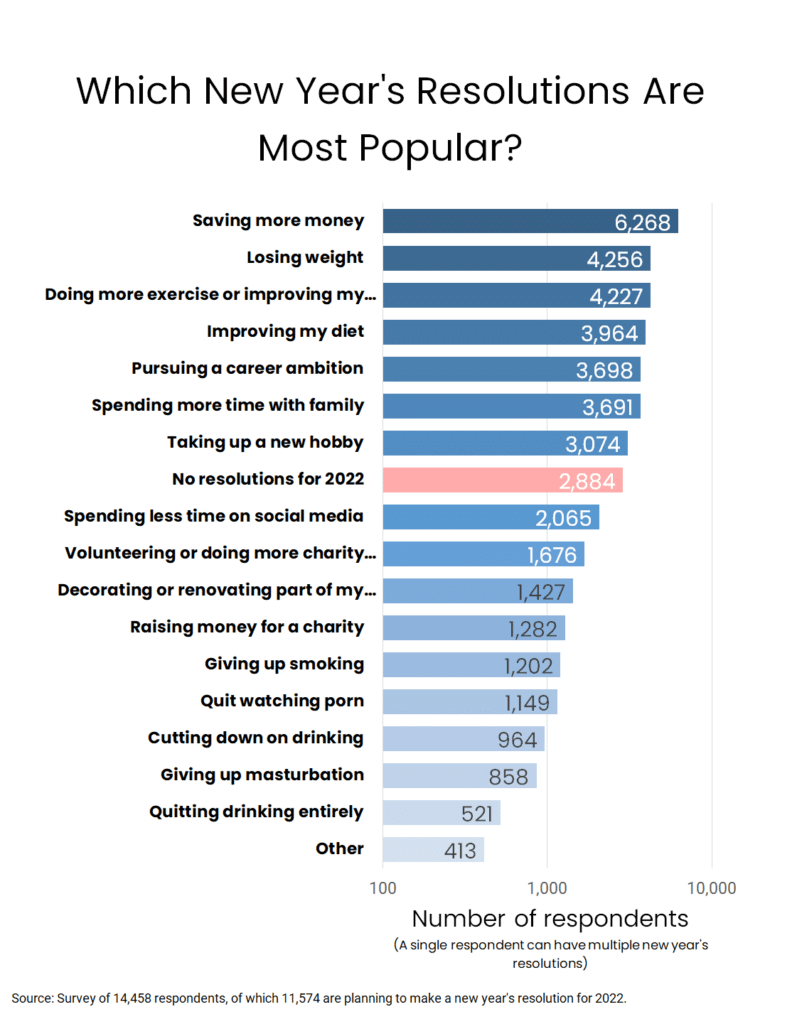
Of all the 14,458 respondents in our survey, the majority (80%) replied that they were planning on making at least one new year’s resolution. In total, these respondents choose 40,735 new year’s resolutions, at an average of 3.5 new year’s resolutions per person.
The most popular new year’s resolution for 2022 is to “save more money”.
Based on this data, we’ve learned some statistics about the popularity of different new year’s resolutions:
- 54.2% of people’s new year’s resolution is “Saving more money”.
- 36.8% of people’s new year’s resolution is “Losing weight”.
- 36.5% of people’s new year’s resolution is “Doing more exercise or improving my fitness”.
- 34.2% of people’s new year’s resolution is “Improving my diet”.
- 32.0% of people’s new year’s resolution is “Pursuing a career ambition”.
- 31.9% of people’s new year’s resolution is “Spending more time with family”.
- 26.6% of people’s new year’s resolution is “Taking up a new hobby”.
- 17.8% of people’s new year’s resolution is “Spending less time on social media”.
- 14.5% of people’s new year’s resolution is “Volunteering or doing more charity work”.
- 12.3% of people’s new year’s resolution is “Decorating or renovating part of my home”.
- 11.1% of people’s new year’s resolution is “Raising money for a charity”.
- 10.4% of people’s new year’s resolution is “Giving up smoking”.
- 9.9% of people’s new year’s resolution is “Quit watching porn”.
- 8.3% of people’s new year’s resolution is “Cutting down on drinking”.
- 7.4% of people’s new year’s resolution is “Giving up masturbation”.
- 4.5% of people’s new year’s resolution is “Quitting drinking entirely”.
Other – less frequent – new year’s resolutions included “Travel more”, “Stop people-pleasing”, “Quit gambling” and “Travel to Lake Bled in Slovenia”. 😅
Do happy people make different new year’s resolutions?
Happy people are more likely to make a new year’s resolution. But do these happy people make different new year’s resolutions?
We compared the average happiness ratings of 11,574 respondents for each new year’s resolution. Here’s the data:
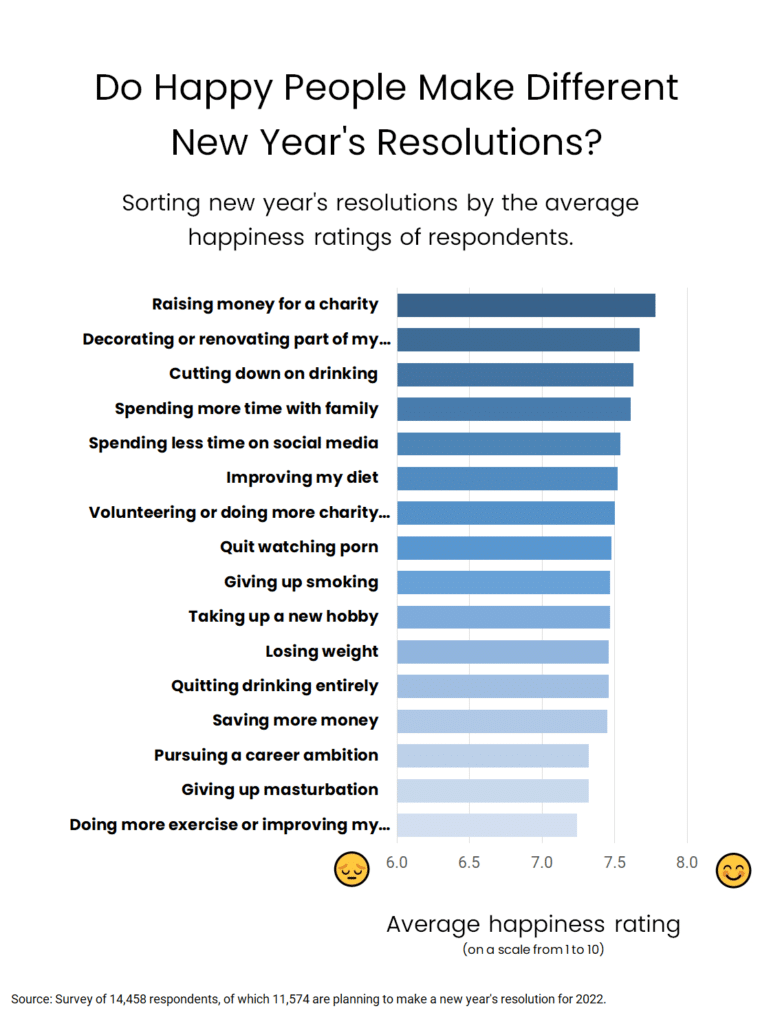
This shows an interesting difference between the happiness of our respondents.
People who want to “Raise money for a charity” as their new year’s resolutions are generally the happiest.
The following new year’s resolutions are made by people who are happier than average:
- Raising money for a charity (7.78).
- Decorating or renovating part of my home (7.67).
- Cutting down on drinking (7.63).
Whereas these following new year’s resolutions are made by relatively unhappy people:
- Doing more exercise or improving my fitness (7.24).
- Pursuing a career ambition (7.32).
- Giving up masturbation (7.32).
People who want to “Do more exercise or improve my fitness” as their new year’s resolutions are generally the unhappiest.
It’s easy to see why “Doing more exercise or improving my fitness” is ranked at the bottom of the happiness chart. It’s been proven that people who are unfit or overweight score significantly lower on happiness and overall mental health.
How many new year’s resolutions are broken?
Despite all these positive hopes and dreams for 2022, the data proves that almost half of these resolutions will likely be broken.
47.4% of all new year’s resolutions will likely be broken.
We tracked all individually made new year’s resolutions, and asked our respondents whether or not they kept or broken them.
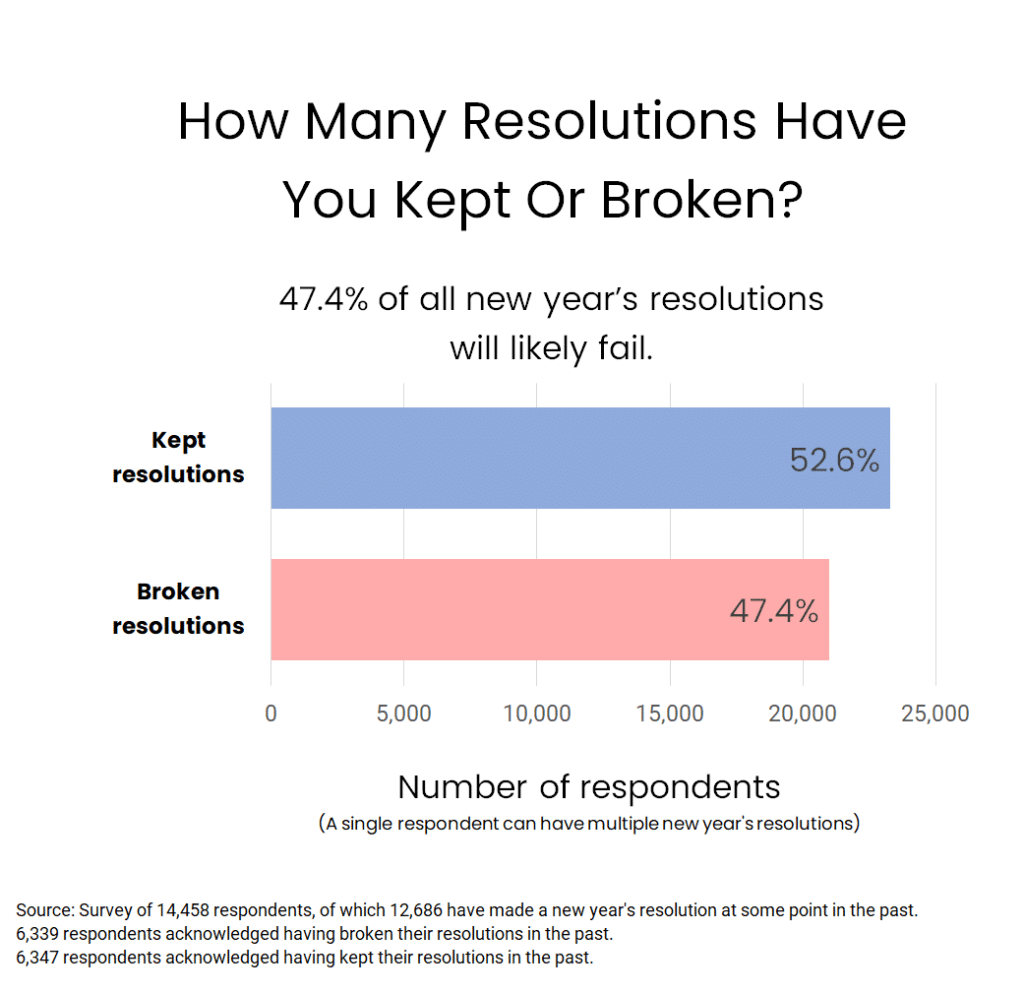
We asked our respondents about previously made resolutions:
- Did you ever make a new year’s resolution in your life?
- In the past, were you good at keeping your new year’s resolution?
- Which resolutions have you made (and kept!) in the past?
- Which resolutions did you break in the past?
The answers show that roughly 50% of people manage to keep their new year’s resolutions.
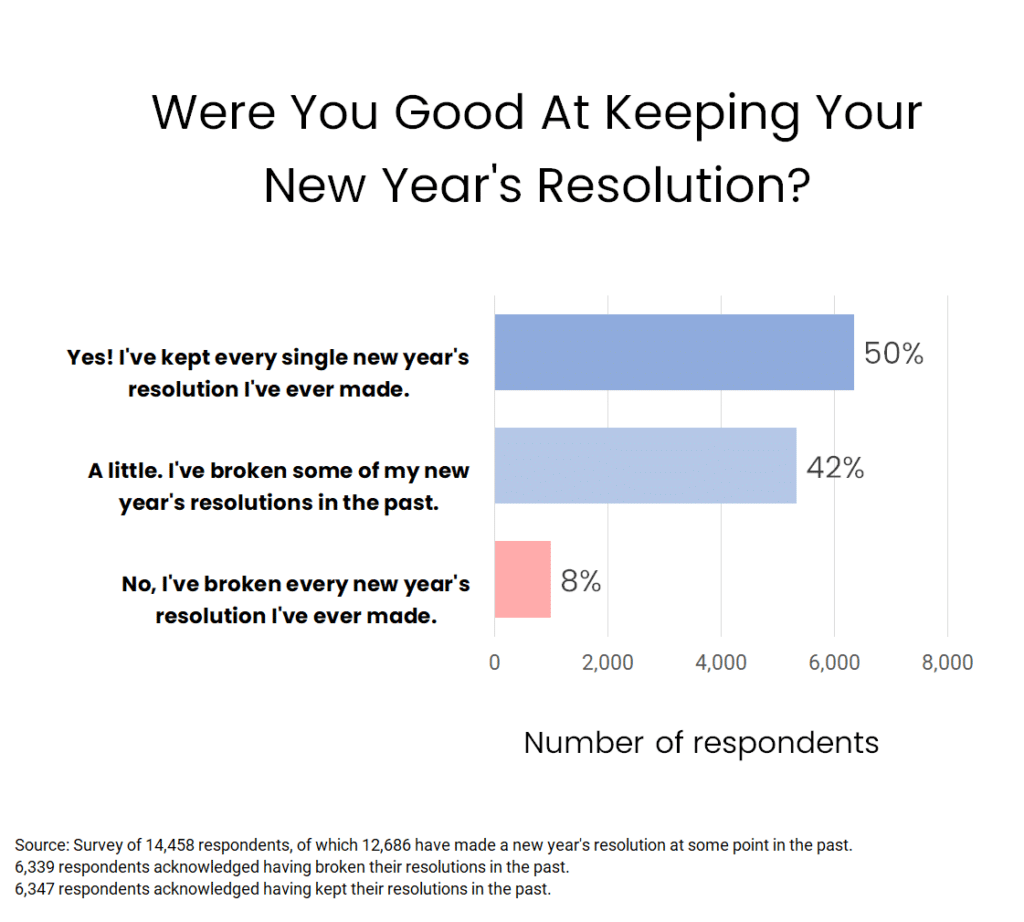
Which new year’s resolutions are most likely to be broken?
If you’re planning to make “Quit drinking” your new year’s resolution for 2022, you’re in for a challenge.
Based on our data, we determined how likely some new year’s resolutions are to be broken. Here’s how each new year’s resolution compared:
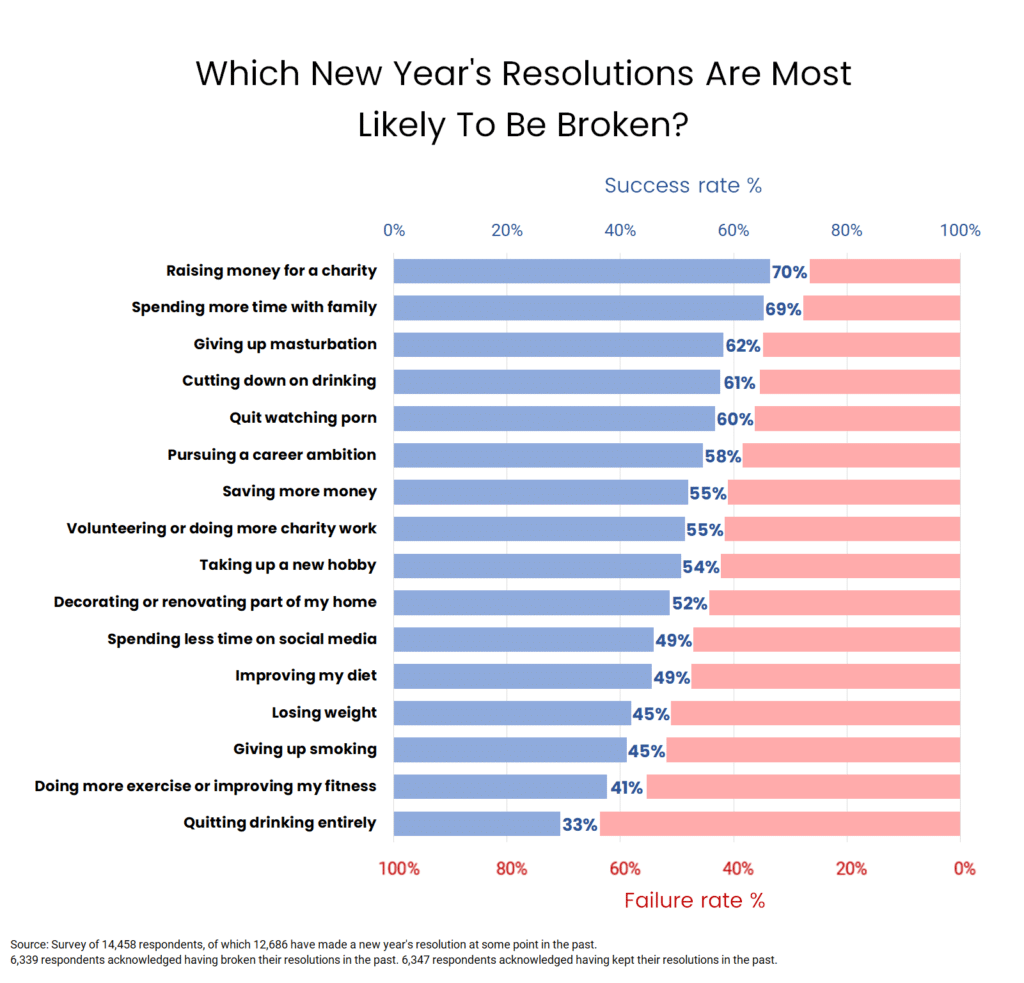
Some interesting observations from this data:
- “Quitting drinking entirely” is the most difficult-to-keep new year’s resolution.
- “Raising money for a charity” is the easiest new year’s resolution, with a success rate of 70%.
- “Spending less time on social media” is amongst the more difficult-to-keep new year’s resolutions, confirming the thight grip that social media companies – such as
FacebookMeta – have on our lives. - Nearly 60% of people that want to do more exercise or improve their fitness will break their new year’s resolution.
- In contrast to quitting drinking entirely, the majority of respondents who simply want to “cut down on drinking” will keep their resolutions.
“Quitting drinking entirely” is the most frequently broken new year’s resolution.
So, if you’re still deciding which new year’s resolution to make, these statistics might help you avoid failure in the new year!
The impact of a broken new year’s resolution on our happiness
The data shows that roughly half of all new year’s resolutions will be broken. But will this impact your happiness?
We compared the thousands of broken new year’s resolutions with the respondents, and found some very interesting results.
- The average happiness rating of all respondents (14,458) is 7.09.
- The average happiness rating of respondents with broken new year’s resolutions (6,339) is 6.52.
- The average happiness rating of respondents who failed to “Quit drinking entirely” (664) is 6.05.
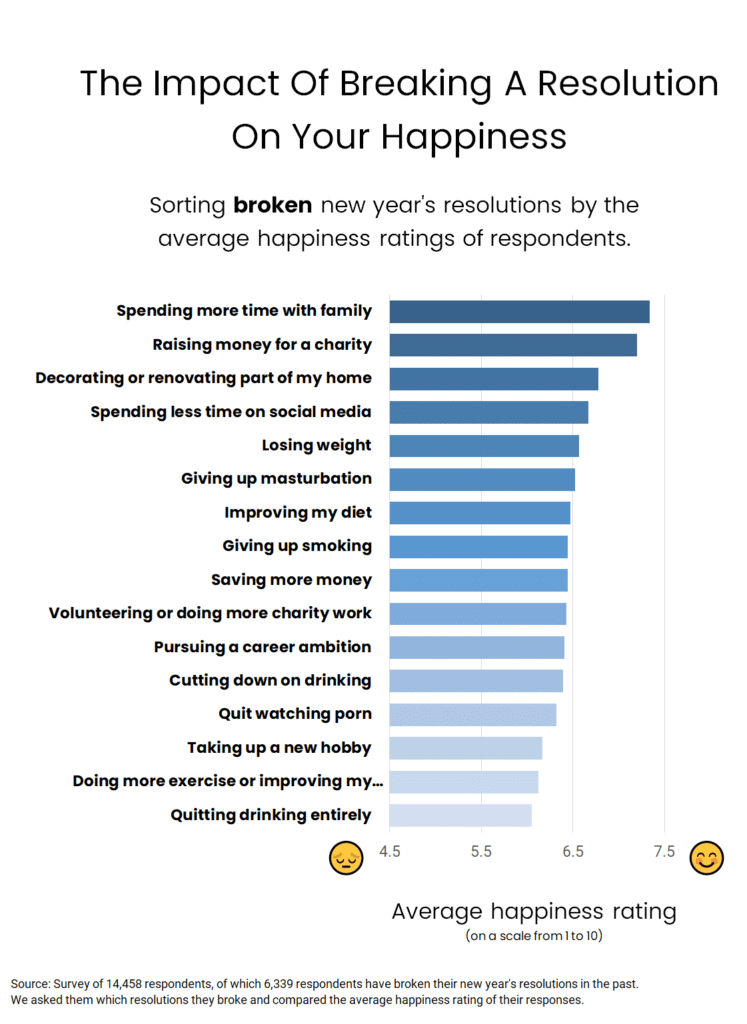
This shows that “Quitting drinking entirely” is not only the most broken new year’s resolution, it’s also the one that leaves you most unhappy.
Breaking the resolution “Quitting drinking entirely” seems to have the biggest impact on a person’s happiness.
Perhaps more interesting is that the new year’s resolution “Spending more time with family” ranks on top of this list. The average person who failed to keep this new year’s resolution has a happiness rating of 7.34.
Interestingly enough, this is higher than the average happiness rating of all our respondents.
This implies that failing to spend more time with family actually has a positive influence on a person’s happiness. What causes this difference? Perhaps we should have made the difference between direct family and family-in-law?
We’ll let you decide.
Is there a difference between men and women?
Do women make more new year’s resolutions? Do men make different goals for the new year?
We compared our male and female responses, and found some noteworthy differences:
- Women make more new year’s resolutions, but only slightly. Women make an average of 3.65 resolutions, whereas men make 3.42 resolutions on average.
- Men are slightly better at keeping their new year’s resolutions. 52.7% of men have kept their past new year’s resolutions, while the same can be said for 46.8% of our women respondents. This difference can partially be explained by the fact that women make more new year’s resolution per person.
However, what we found more interesting is the difference between men and women on some new year’s resolutions.
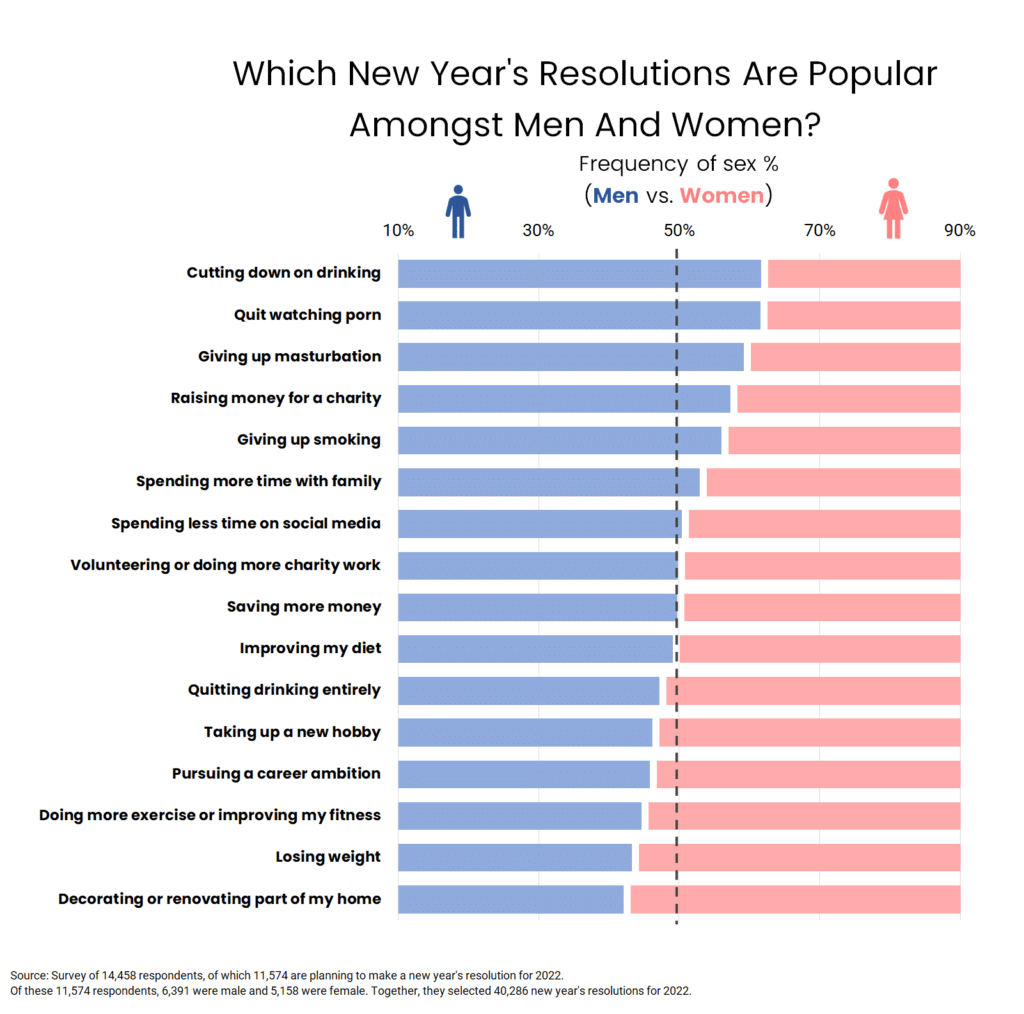
- “Cutting down on drinking” is made up of 62.2% male respondents.
- “Quit watching porn” is made up of 62.1% male respondents.
- “Giving up masturbation” is made up of 59.7% male respondents.
Giving up masturbation, quitting watching porn, and cutting down on drinking are resolutions made mostly by men.
On the other hand, some resolutions were dominated by our female respondents:
- “Decorating or renovating part of my home” is made up of 57.4% female respondents.
- “Losing weight” is made up of 56.2% female respondents.
- “Doing more exercise or improving my fitness” is made up of 54.9% female respondents.
Methodology
If you’re curious to learn more about our methodology, here’s a link to our study appendix that explains it all (opens in a new window):
Fair use and redistribution
Tracking Happiness grants you permission to reuse, host, or repost the graphics and images from this article. When doing so, we ask that you kindly attribute the authors by linking to Tracking Happiness or this page.
Closing words
If it isn’t clear by now, we are big supporters of making new year’s resolutions. We hope this study helps you in making your new year’s resolutions for 2022, with extra motivation to not break them. And even if you do, don’t sweat it because apparently, you are not alone.
What’s your main takeaway from today’s study? Do you have a question about something from our analysis? Leave a comment below to let us know.


Commentary from the team:
Hugo Huijer, Founder of Tracking Happiness
If you’re someone who only goes to the gym on the 3rd of January and never again, you can rest assured: you are not the only one. 59% of people break their resolution of doing more exercise and end up with wasted gym memberships!
Don’t be discouraged. New year’s resolutions are more often made by happier people, to begin with. But how come that people who set new year’s resolutions are happier than those who don’t? You could argue that making a new year’s resolution means that there’s an aspect of your life that you are unhappy with and want to improve.
We believe that a willingness to improve one’s life is correlated with an optimistic mindset, and therefore, a happier mindset. Respondents who are making new year’s resolutions – regardless of whether they keep them or not – are happier than those who don’t bother to try. Being mindful of the aspects in your life that you want to improve is a form of self-awareness, which in turn is proven to be correlated with happiness.